Country AFL clubs taking a stand against restructure
THERE’S a fight brewing on Victoria’s local footy fields. As AFL bosses push to restructure country clubs, there’s a new resistance as clubs raise concerns over the future of the game.
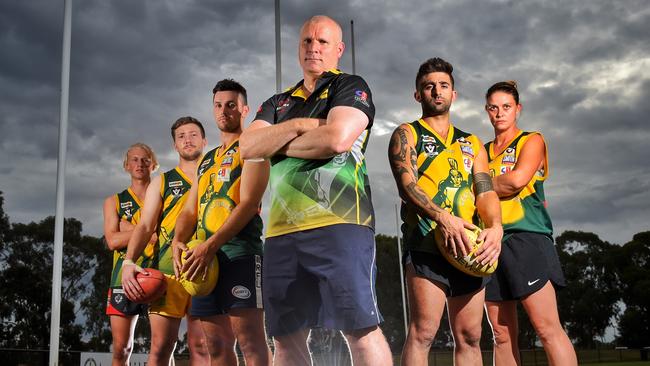
VIC News
Don't miss out on the headlines from VIC News. Followed categories will be added to My News.
NEVILLE Whitley was six years old when he served in his first official role for his local footy club.
Appointed club mascot at East Geelong he still remembers running out alongside the senior squad during a golden era when the boys claimed three consecutive premierships from 1946.
Here was a kid who grew up surrounded by footy rivalries, mateship and tall stories spruiked over cold beer.
It was a community; a church of sorts, where members of the congregation raised their hands in praise of the grassroots game every Saturday.
His father Jim was the football club manager, a hard working volunteer who ploughed through paper work as he watched from the sidelines.
Players got changed in an old army hut, divided in two by hessian bags for privacy.
COUNTRY FOOTBALL LEAGUES DIG IN HEELS OVER AFL VICTORIA’S RESTRUCTURE OF THE GAME
AFLW POPULARITY PUSHES SUBURBAN GROUNDS TO CAPACITY
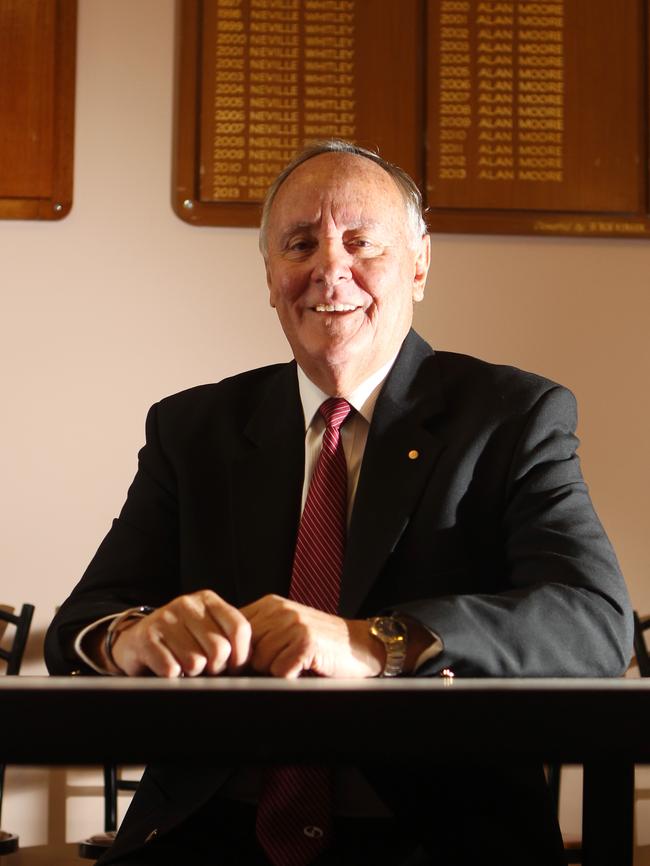
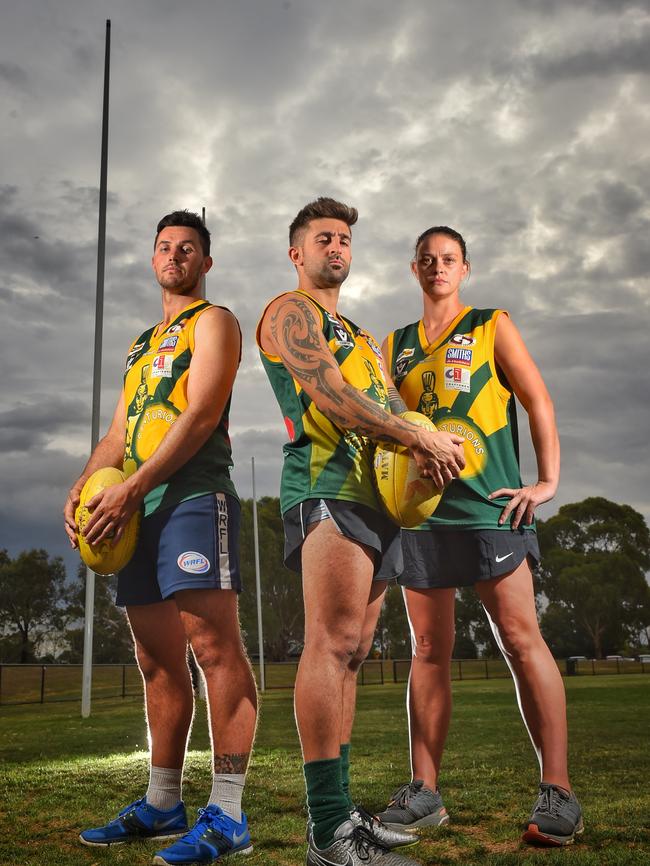
Most weekends Mr Whitley’s mother was tasked with washing the entire team’s guernseys.
She’d soak the mud off them in an old copper pot in the wash house then hung them from the line outside their humble weatherboard in Anderson St.
In the depths of winter, she would drape the team colours around the open fire in a battle to get them dry.
Mr Whitley joined the junior footy ranks and by his late teens had shown enough potential to earn a place on the senior squad; though he admits he spent most of the time in reserves as a full back.
He reckons the next move might have been over the fence.
It wasn’t of course. He played 268 games in all before shifting his focus to follow in the footsteps of his father.
He’d already seen the impact a good footy club could have on a community and he desperately wanted to stay a part of it.
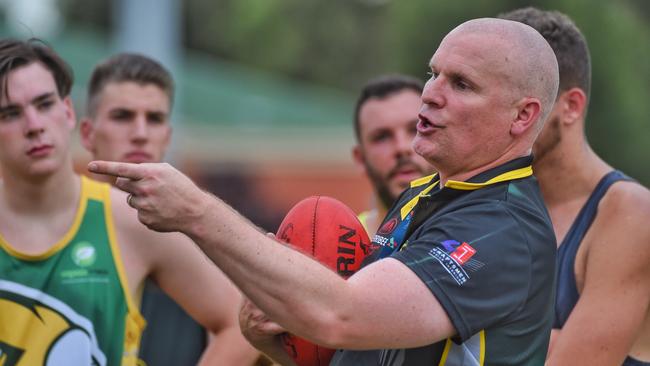
Mr Whitley served on the committee for more than 20 years, eight as club president before securing a role as league chief by 1985.
He has remained in the role ever since, helping to create one of the most successful and self-sustaining regional competitions anywhere in Australia.
But at 77, Mr Whitley has emerged as one of the leaders behind a new resistance as an increasing number of locals with an entrenched love for local footy flag concerns about the direction the game is headed.
“Footy clubs are the fabric of the local communities and the people involved, the volunteers are at the heart of that,’’ Mr Whitley said.
“The deeper into country competitions you go, the more important volunteers have become.
“It’s important they are supported but there are increasingly concerns that AFL Victoria is forgetting that.’’
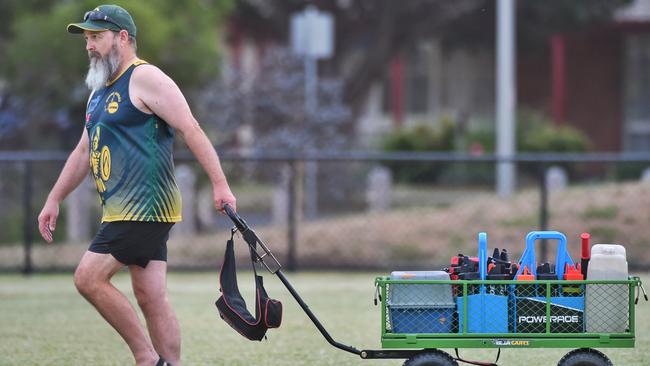
The Geelong and District Football League president is now a key protagonist in the fight against the restructure of country and regional football in Victoria.
In 2011, the Review of Football in Country Victoria pointed to the need for better administrative structure to ensure clubs and leagues could deliver sustainable competitions.
It resulted in the formation of 13 region commissions across the state, forming an umbrella network, AFL Victoria hopes will include every league by the end of 2019.
Within each commission, independent regional administration centres (RACs) have been established with an aim of streamlining the daily workings within clubs, much like a body corporate.
But AFL Victoria boss Steven Reaper said the restructure had been clouded by misinformation, even fear mongering from established leagues and the likes of Mr Whitley who are eager to hold onto their powerbase.
“We are dealing with a couple of leagues here who are quite happy with their own administrations and all we have suggested is there scope to create greater efficiencies of scale through administration,’’ Mr Reaper said.
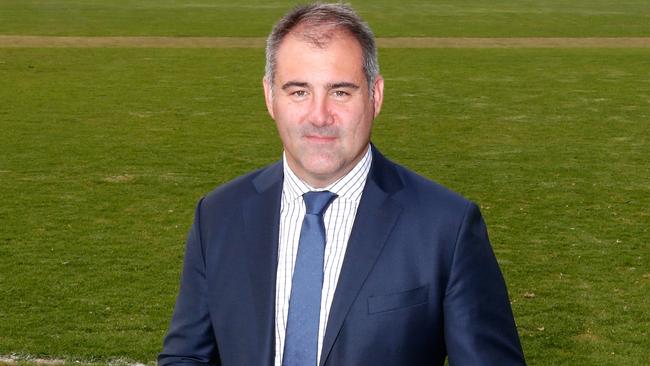
“That is where I think there is some clear confusion between the difference between administration and governance.
“We suggested there is scope for administrative services on a greater scale in a more efficient manner,’’ he said.
“We need leagues to start considering what the most efficient and positive way of working in collaboration as a sport.
“We won’t back away from those discussions about what is the best structure. It’s not a case of ‘you have to join or you will be disaffiliated’.’’
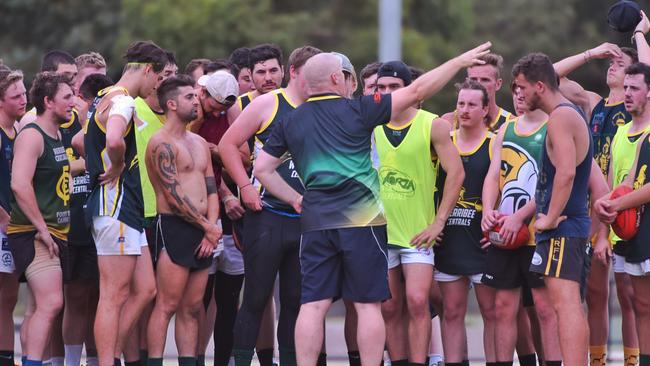
But that’s not the message filtering down at club level.
At a meeting at Bungaroo between concerned leagues, clubs and umpires in mid February, representatives voiced their fears the formation of RAC could spark the beginning of a dictatorship they didn’t want to the a part of; the kind likely to strip century-old leagues of identity.
There was talk that one AFL honcho had informed a group of clubs outside Bendigo they faced being disbanded unless they signed affiliation agreements.
Another league had apparently been told to cut a club that had continually pushed back against the administrative changes.
In a letter to the AFL, one country club claimed it would sign the document but would do so under duress.
The saddest anecdotes were relayed from disheartened country coaches worried they’d signed away their rights after the AFL commissions emailed contracts without explanation, an end date or promise of a review period.
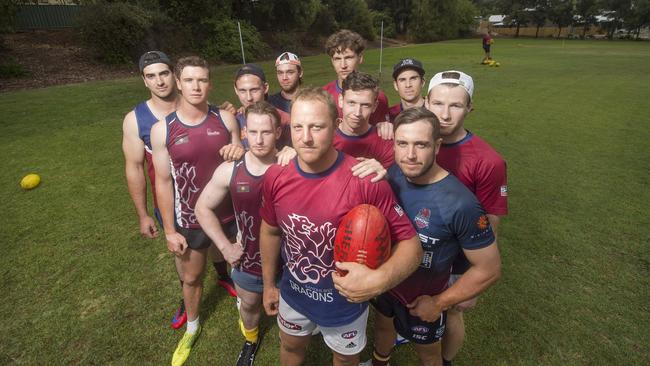
The Mornington Peninsula Nepean Football League are among the fraternities to have second thoughts after signing up.
Plagued by internal management issues in 2015, the league sought the help of the region commission, AFL South East and its administration arm.
In debt and with nowhere to turn, insiders say the RAC sold the league premises in Somerville from under them and has since failed to provide any documentation explaining how profits from the sale have been used to pay down debt or where the remainder of the money is being held.
“This was our asset, we brought it to them and in a completely underhanded way they have gone and sold it from under us,’’ spokesman Anthony Matthews said.
“There has been no final accounting of the debt of the previous administration.
“They tell us 80 per cent of the balance from the sale is in a term deposit but we don’t even know how much it is.’’
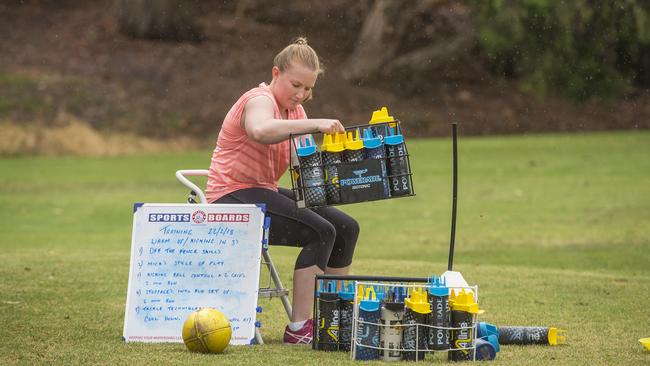
Meanwhile, the regional competition, previously managed over two stand alone divisions, has been divided into a promotion-relegation format with three top teams coming down and three bottom teams moving up.
It is one move clubs are said to have been happy with but by 2019 the inclusion of eight more teams from the South East Football Netball League will mean players will have to travel for matches in Narrewarren, Beaconsfield, Berwick and Cranbourne.
“The majority of clubs feel the commission has failed to deliver on all of their key commitments to the clubs when we first took the step of inviting them to take over our governance,’’ Mr Matthews said.
“It was supposed to be a two year caretaker period, an opportunity for them to steady the ship.’’
He said when the league attempted to rewrite its rules in a bid to detach from the commission that the veiled threats began.
Documents made available to the Herald Sun reveal AFL South East regional general manager John Anderson outlined to the MPNFL what they broke away from the commission.
It included access to the AFL sports database, public liability insurance, funding opportunities, pathway programs and access to accredited coaching and umpiring courses.
“The benefits outlined above will no longer be available if MPNFL clubs proceed to sever the connection with the AFLSE,’’ Mr Anderson said.
To the north of the state, the Murray Football League took issue with emerging conflicts over sponsorships.
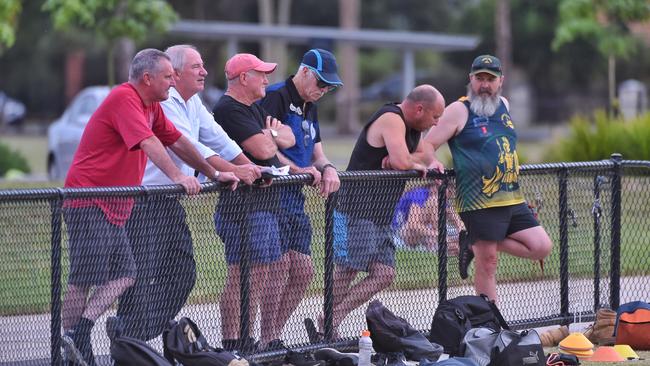
It pointed to a lucrative partnership it had clinched with car manufacturer Isuzu — a direct rival to Toyota, a commercial affiliate of the AFL.
MFL general manager Dale Norman told local media sponsors would weigh up their options if they weren’t getting value for money.
Concerns about the impact of the restructure extend beyond football networks with experts warning the AFL needed to tread more carefully.
Victoria University Institute of Health and Sport research fellow Dr Matthew Klugman said there was a “clear threat’’ to the heart and soul of grassroots footy.
“AFL Victoria has a pattern of ‘rationalising’ competitions in line with their own needs and priorities with little regard for either the history of these competitions or the importance of clubs to their local communities,’’ Dr Klugman said.
“The results tend to be dramatic changes that suit AFL Victoria but have drastic effects on certain clubs and their local communities.’’
He said it happened with the VFA and more recently with the VWFL where the 2017 grand finalists Diamond Creek were forced out of the `revamped VFLW’ competition.
Two other teams have also been shown the door with another club facing significant questions regarding their long-term viability.
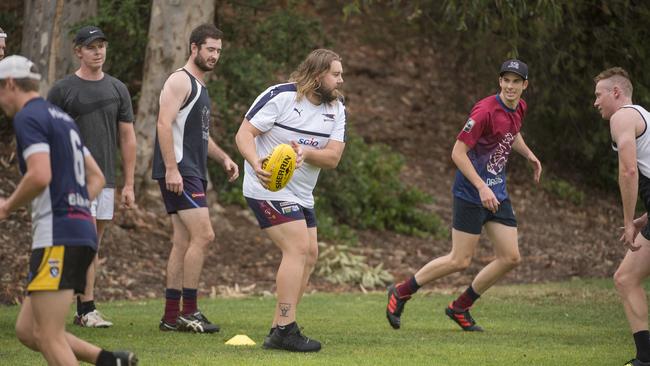
“I believe that as the most powerful Australian rules football league, the AFL and its state bodies have a duty to preserve and celebrate the history and heritage of the game at all levels, not just the most elite level.
“As part of this, they need to work closely with local organisations, rather than assume control in a corporate manner that imposes streamlined solutions that have the potential to wreak havoc.’’
But not everyone is unhappy.
Goulburn Valley and Kyabram District are numbered among a string of leagues yet to find fault, pushing ahead with agreement renewals under the commission framework.
“ ... we’re very happy with our situation,’’ Goulburn Valley League chairman David Roff said earlier this month.
‘‘We’re very happy with the service they provide.’’
Mr Reaper remains adamant the sweeping changes to football operations across country and regional centres was for the betterment of the game.
He is also focused on hosing down unnecessary speculation and innuendo saying clubs were not being backed into any corners.
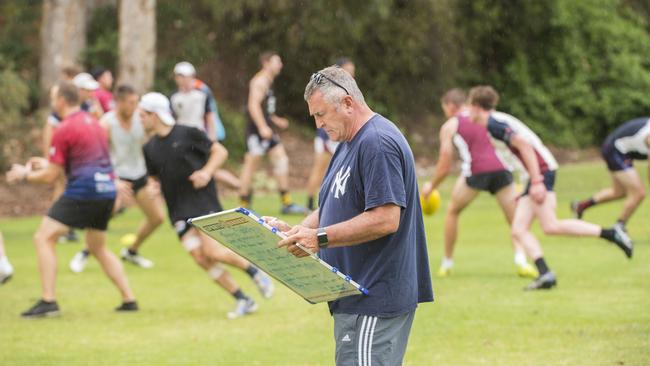
He said threats regarding the loss of insurance, TAC pathway programs and training support had never been made — but conceded that would be the potential outcome for clubs and leagues who were not affiliated.
Otherwise, he said the benefits of signing up to the RACs were clear.
“We have seen a hell of a lot of examples where we have created these administration centres and leagues that were on their knees are now beneficiaries with far better systems in place than what they would have been able to achieve otherwise.
“I agree that some of these leagues can run a good competition but that is all they are doing. They are not actually doing anything else to grow the game.
“Ultimately if the AFL didn’t give two sh--- about community football where would we be as a sport?
“Our facility developments would be limited, our ability to have participation programs invested in would be significantly reduced.’’
He said an underlying antagonistic attitude from problematic leagues had led to clubs snubbing RAC workshops aimed purely at helping volunteers improve their skill set.
“We are dealing with a small minority that are making some noise around what the future looks like, from my point of view there are these issues can be resolved with an open mind.’’


